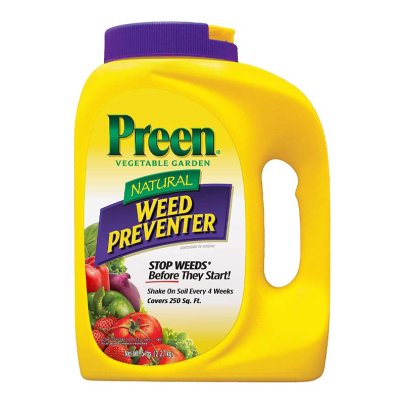
We may earn revenue from the products available on this page and participate in affiliate programs. Learn More ›
Some turfgrass types wilt at the first sign of temperatures higher than 100 degrees Fahrenheit, drought, or salty sea spray, but Bermuda grass keeps its cool under these harsh conditions, making it well suited to Southern states and coastal regions. On the downside, Bermuda grass is relatively high maintenance, has nutrient requirements, and is susceptible to weeds such as crabgrass, clover, and nutsedge.
Those looking to establish a yard of lush Bermuda grass may need to apply a weed killer once or more a year, depending on the types of weeds that become a problem. Ahead, learn more about getting rid of weeds in Bermuda grass lawns, and find out why the following products are among the best Bermuda grass weed killers on the market.
- BEST OVERALL: Espoma Organic Weed Preventer
- BEST BANG FOR THE BUCK: Harris 20% Vinegar Weed Killer
- BEST FOR CRABGRASS: Preen Natural Garden Weed Preventer
- BEST POST-EMERGENT: Just for Pets Pet Friendly & Pet Safe Weed Killer
- BEST WEED AND FEED: Concern Weed Prevention Plus
- BEST FOR NUTSEDGE: Green Gobbler 20% Vinegar Weed & Grass Killer
- BEST PRE-EMERGENT: The Andersons Barricade Pre-Emergent Weed Control

Before You Buy Weed Killers for Bermuda Grass
Although using a weed killer for Bermuda grass is effective, it’s not the only way to get a lawn weed-free. We recommend trying other weeding methods (including these weirdly effective ways to weed) before using a weed killer. Weed-killing products can contain chemical ingredients that are toxic to individuals and the environment.
Though tedious, physical weed removal is the safest way to get a Bermuda grass lawn free of weeds. Frequent weeding makes it easier to stay on top of weed control. For a bit of extra help preventing weeds, consider a natural pre-emergent weed-control product. These products prevent weeds from sprouting, keeping lawns weed-free without the need to resort to weed killers.
If the weeds start getting a little more out of control, a weed killer can help. Weed killers can be applied to just the problem areas; the less weed killer used, the less human and environmental exposure to the product. Choose a natural weed killer when possible.
How We Chose the Best Weed Killers for Bermuda Grass
In choosing the best weed killers for Bermuda grass lawns, we focused on products formulated to kill a variety of weeds without harming the environment. With sustainability in mind, we avoided harmful ingredients (such as 2,4-D), instead choosing weed killers that are safer overall and less harsh on the environment.
We included weed killers with both natural and synthetic ingredients, formulated for different purposes. We prioritized weed killers with lower toxicity, preferring naturally derived products over chemical ones. For those who want the least toxic option, we included a natural organic weed killer on our list.
We also looked at products that prevent weed seeds from sprouting, known as pre-emergent herbicides. These products form a barrier on the surface of the soil that lasts anywhere from 2 to 4 months. The downside is that although pre-emergents stop weed seeds from germinating, they also prevent beneficial seeds from germinating, so they should not be used before reseeding a lawn. Of course, post-emergent herbicides were also included on our list, which are made for killing weeds after they sprout.
Our Top Picks
To qualify for a spot in this lineup, the following products had to contain ingredients known to kill weeds effectively. The products had to be straightforward to apply—we allowed for some measuring and mixing—but we excluded products if the user had to reapply the solution multiple times for a successful treatment. Though individual lawn needs vary, one of the picks in our lineup is sure to be a good choice for getting rid of weeds in a Bermuda grass lawn.
Best Overall
Espoma Organic Weed Preventer
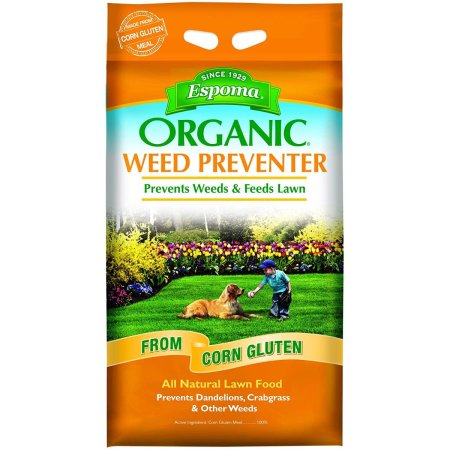
Pros
Cons
Product Specs
- Form: Granular
- Pre-emergent or post-emergent: Pre-emergent
- Application method: Drop spreader
Espoma Organic Weed Preventer forms a barrier on the surface of the soil that keeps weed seeds from sprouting, and it contains only natural ingredients. In addition to controlling unwanted weeds, it also fertilizes the lawn, making it one of the best weed-and-feed products in this lineup.
Espoma’s weed preventer contains corn gluten meal—a natural, organic ingredient that functions as a pre-emergent to keep weed seeds from germinating. In addition, this granular product contains nitrogen, the nutrient that grass needs for robust growth and to develop a rich color. Best of all, because it has no harmful chemicals, there’s no need to worry about pets and children playing on a lawn after treatment. A 25-pound bag of this organic product treats up to 1,250 square feet of lawn. Espoma recommends applying this product twice a year, in the early spring and fall.
Get the Espoma weed killer for Bermuda grass at Amazon, Ace Hardware, True Value, or SHC Supply.
Best Bang for the Buck
Harris 20% Vinegar Weed Killer
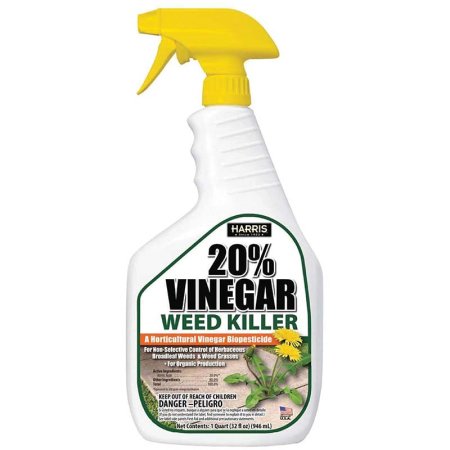
Pros
Cons
Product Specs
- Form: Liquid
- Pre-emergent or post-emergent: Post-emergent
- Application method: Spray
Kill weeds naturally using Harris 20% Vinegar Weed Killer, an affordable, nonselective weed killer that harnesses the power of vinegar to kill weeds. Using a 20 percent vinegar formula, which is a concentration four times stronger than regular table vinegar, this acidic formula browns and shrivels plants. This reaction occurs soon after the weed killer comes into contact with targeted weeds.
This weed killer comes in a ready-to-use spray bottle, which means no mixing or diluting is required for use. It should be used as needed to kill a wide variety of weeds, including crabgrass, dandelions, clover, and more. However, because it’s a nonselective weed killer, it has the potential to harm the surrounding grass, so take care when using this product.
Get the Harris weed killer for Bermuda grass at PF Harris or Max Warehouse.
Best for Crabgrass
Preen Natural Garden Weed Preventer
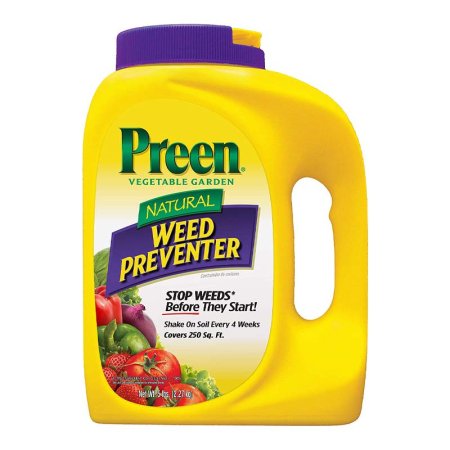
Pros
Cons
Product Specs
- Form: Granular
- Pre-emergent or post-emergent: Pre-emergent
- Application method: Drop spreader or flip-top applicator
Made of 100 percent corn gluten meal, Preen Natural Garden Weed Preventer is a natural way to prevent crabgrass as well as other common weeds such as clover, dandelions, and foxtail. This pre-emergent herbicide comes in granular form, ready to sprinkle on lawns before weeds spring up. There’s no drop spreader needed (although gardeners can use a drop spreader, if preferred). The granules come in a flip-top application that makes it easy to sprinkle over lawns.
Like other corn-gluten-meal products, this herbicide is very safe. It can be used around all established plants, including lawns, vegetables, and herbs. It’s nontoxic, to the point where it’s safe for children and pets to use the lawn immediately after application. Preen recommends reapplying this weed preventer every 4 to 6 weeks.
Get the Preen Natural Garden weed killer for Bermuda grass on Amazon or at The Home Depot.
Best Post-Emergent
Just For Pets Pet Friendly & Pet Safe Weed Killer
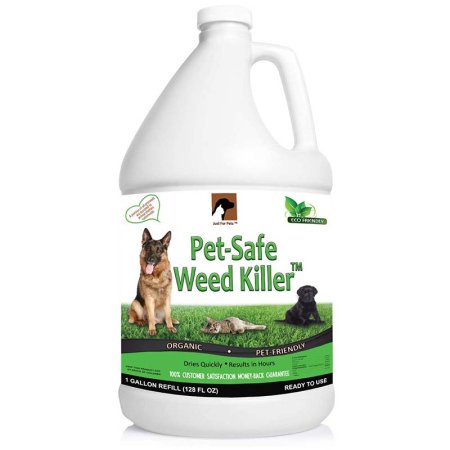
Pros
Cons
Product Specs
- Form: Liquid
- Pre-emergent or post-emergent: Post-emergent
- Application method: Spray
Just For Pets Pet Friendly & Pet Safe Weed Killer is safe for pretty much any household when used as directed. This nonselective post-emergent weed killer is formulated with pet parents in mind, using natural ingredients to target weeds.
The large bottle comes ready to use, immediately available to spray on pathways and lawns. Keep in mind that because it’s nonselective, which means it has the potential to kill grass, it will need to be applied sparingly and carefully. One positive note is that this post-emergent herbicide is fast drying, which lowers its potential to spread and also means pets can get back to playing on the lawn again soon after application.
Get the Just for Pets weed killer for Bermuda grass on Amazon.
Best Weed and Feed
Concern Weed Prevention Plus
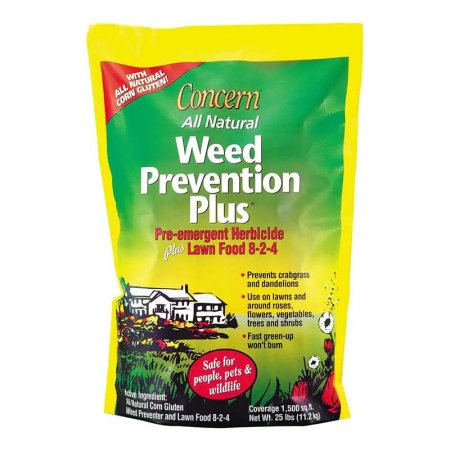
Pros
Cons
Product Specs
- Form: Granular
- Pre-emergent or post-emergent: Pre-emergent
- Application method: Drop spreader or shaker bag
Concern Weed Prevention Plus is a pre-emergent weed-and-feed product, formulated to prevent weeds such as crabgrass and dandelions while also providing grass with vital nutrients. Its active ingredient is corn gluten meal, a natural product that stifles weeds before they can grow.
To feed Bermuda grass, this product contains lawn food with an nitrogen-phosphorus-potassium analysis of 8-2-4 (8 percent nitrogen, 2 percent phosphate, and 4 percent potassium). The fertilizer is slow releasing, seeping at a steady rate into the soil for weeks to help green up lawns without burning them.
This product comes in a granular form that is easy to spread with a drop spreader or by using the built-in shaker in the bag. Nontoxic ingredients make this product safe to use on lawns, vegetable patches, and around flowers, trees, and shrubs. Best of all, there’s no need to wait before using the lawn after application.
Get the Concern weed killer for Bermuda grass at The Home Depot.
Best for Nutsedge
Green Gobbler 20% Vinegar Weed & Grass Killer
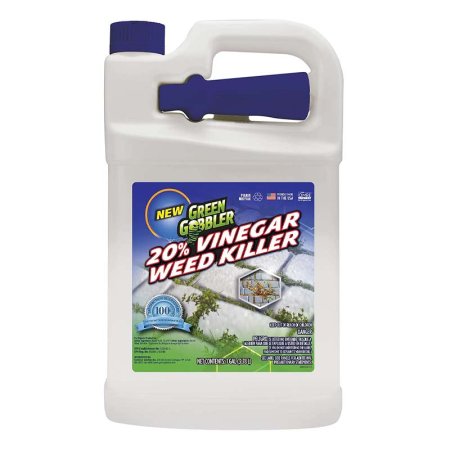
Pros
Cons
Product Specs
- Form: Liquid
- Pre-emergent or post-emergent: Post-emergent
- Application method: Spray
Green Gobbler 20% Vinegar Weed & Grass Killer is another nonselective weed killer that uses the power of vinegar to target weeds. Its main ingredient is vinegar at a 20 percent concentration, which is effective to target all types of annual and perennial weeds, including dandelions, crabgrass, and nutsedge, which is a common Bermuda-grass lawn pest.
The vinegar used in this formula is naturally derived from corn. It is Organic Materials Review Institute listed and approved for organic use, making this weed killer a good choice for veggie patches, gardens, and lawns.
However, like other vinegar-based weed killers, this herbicide is completely nonselective, which means it can kill grass as well as weeds. Careful placement is key to shriveling up weeds while maintaining green and healthy grass.
Get the Green Gobbler weed killer for Bermuda grass on Amazon or at The Home Depot.
Best Pre-Emergent
The Andersons Barricade Pre-Emergent Weed Control
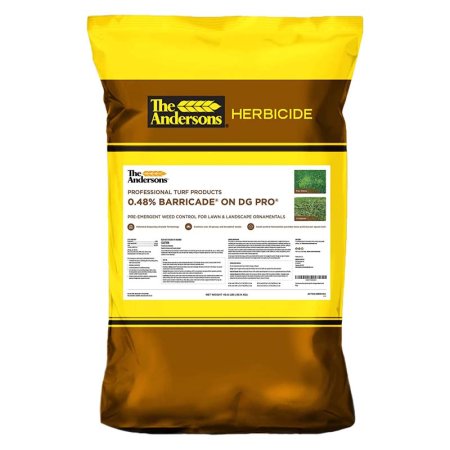
Pros
Cons
Product Specs
- Form: Granular
- Pre-emergent or post-emergent: Pre-emergent
- Application method: Drop spreader
The Andersons Barricade Pre-Emergent Weed Control uses a chemical active ingredient to control weeds, unlike the natural ones on our list. This product is a pre-emergent herbicide and uses prodiamine to stifle weeds before they grow. This ingredient is effective, but it can be toxic to aquatic life, so we recommend first trying natural options. If those options aren’t getting the job done, this herbicide is a professional-grade alternative.
This pre-emergent herbicide comes in granular form. The granule particles break down once they come in contact with water, dispersing their weed-choking abilities over the lawn without causing harm to Bermuda grass. This product is formulated to prevent more than 30 grassy and broadleaf weeds in established lawns, landscapes, and garden beds.
Get The Andersons weed killer for Bermuda grass on Amazon or at The Home Depot.
Or, DIY Your Own Weed Killer
Making a DIY weed killer is simple and makes it possible to avoid harmful ingredients. However, keep in mind that almost all DIY weed killers are nonselective, including the recipe ahead. Nonselective weed killers will kill any plant they come into contact with, which means they can harm grass as well as weeds. Treat as small of an area as possible when using a nonselective weed killer on lawns.
Here’s how to make a nonselective DIY weed killer with just a few ingredients:
- White vinegar
- Dish soap
- Table salt
- Water
Mix the ingredients in a large spray bottle using the following measurements:
- About 1 gallon of water
- 1 cup of table salt
- 1 cup of white vinegar
- 1 tablespoon of liquid dish soap
Mix the ingredients until the salt dissolves. Once dissolved, it’s ready to use.
This weed killer is ideal for killing isolated weeds, such as on pathways and patios. It can also be used sparingly on lawns, but keep in mind if it is applied to the lawn, it will probably harm the grass.
Jump to Our Top Picks
Our Verdict
The Espoma weed killer for Bermuda grass makes it possible to control weeds naturally and effectively before they start growing with an organic formula that is safe for use around children and pets. For killing weeds after they’ve sprouted, the Harris weed killer for Bermuda grass is an affordable, nonselective weed killer that comes in a convenient ready-to-use spray bottle.
There are other common weed killers for Bermuda grass such as Southern Ag Amine 2,4-D Weed Killer, Ortho WeedClear Lawn Weed Killer Concentrate, and BASF Drive XLR8 Crabgrass Herbicide. However, they do not meet our sustainability guidelines and are not recommended in our top picks due to their use of harmful chemicals, including dimethylamine salt, which is potentially hazardous.
What to Consider When Choosing the Best Weed Killer for Bermuda Grass
The primary aspect to consider when choosing a weed killer for a Bermuda grass lawn is to use one that is both effective and safe. Selective and nonselective as well as pre- and post-emergent herbicides are all good options. But keep in mind that nonselective herbicides will destroy both grassy weeds and the Bermuda grass, so apply these products carefully. It’s also good to consider the application method and reapplication schedule. We explore these key considerations ahead.
Coverage and Application
The best weed killer products for keeping a Bermuda grass lawn looking lush and uniform come in both granular and liquid form. The granular type is applied with a drop spreader.
The liquid type can come in a concentrated or ready-to-use form. Concentrated weed killers are often diluted with water in a pump-type sprayer and then sprayed on the lawn, or they can come in a dispenser bottle that attaches to a garden hose for easy application. Ready-to-use liquid herbicides can be sprayed as directed without dilution.
Both types are beneficial, but read the product’s instructions. Some types of liquid weed killer are designed to be applied when no rain is in the forecast, while other types require spraying down the lawn after application. Coverage varies by product and container size.
Pre-Emergent vs. Post-Emergent
Weed killers, by definition, are always post-emergent, which means they will kill weeds that are already growing. In other words, the weeds have emerged from their seeds.
Pre-emergent herbicides work by creating a barrier that keeps new weed seeds from sprouting. Keep in mind that pre-emergent herbicides won’t kill existing weeds, and they also shouldn’t be used on lawns undergoing over-seeding in the next few months. Pre-emergents will keep weed seeds from sprouting, but they’ll also keep new grass seeds from germinating as well.
Some pre-emergent herbicides, called weed-and-feed products, contain essential nutrients to promote lawn health while also stifling weeds.
When it comes to overall safety and toxicity, pre-emergent herbicide options tend to fare better than post-emergent. Pre-emergent herbicides often use natural ingredients (corn gluten meal, for example), whereas most post-emergent selective herbicides contain chemical ingredients. The exception is nonselective post-emergent herbicides, of which many natural options are available. These herbicides often use natural ingredients such as vinegar. However, these nontoxic, nonselective options need to be applied very carefully on Bermuda grass lawns to lessen the chance of lawn damage.
Selectivity and Residual Effects
Weed killers (not pre-emergents) are further classified by whether they’re selective or nonselective.
- Selective: Selective means the product kills various unwanted weeds, such as grassy weeds, nutsedge, or crabgrass, but it won’t damage grass.
- Nonselective: This type of post-emergent herbicide kills everything it lands on—including desirable lawn grasses. The most well-known nonselective weed killer is glyphosate, the primary ingredient in Roundup. If inadvertently used on a Bermuda lawn, it will kill both the weeds and the grass.
Although selective weed killers sound like the ideal option, many contain chemical ingredients that are harmful to human health or the environment. For example, 2,4-D is a common active ingredient in selective herbicides, but it has the potential to be very toxic to aquatic life. We’ve chosen to avoid most products like this because of their possible negative effect on the environment.
Natural, nonselective herbicides are widely available, many using vinegar to kill weeds. These natural herbicides tend to be safer and better for the environment. When applied very carefully, nonselective herbicides are useful for targeting weeds on a Bermuda grass lawn.
Safety
Chemical weed killers may contain ingredients that can harm humans, pets, and the environment. As a result, weed killers come with the following warning: “It is a violation of Federal law to use this product in a manner inconsistent with its labeling.”
Because precautions can vary among products, users will want to read and follow the label carefully before use. Common safety recommendations include:
- Don’t deviate from instructions: If the product calls for diluting, don’t mix a stronger solution than recommended, and make sure to treat the lawn when children or pets are not around.
- Store safely: Some weed killers are toxic if inhaled or ingested, which means they must be stored out of reach from children and pets.
- Wear protective clothing: Long sleeves, long pants, and gloves will help keep the solution off the skin, and a pair of work goggles—or at least sunglasses—will protect the eyes.
- Apply on a sunny and calm day: Many weed killers shouldn’t be applied when rain is forecast (usually within 48 hours) in case of runoff, which can harm surrounding plants or marine life. Also, choose a calm day; windblown weed-killing spray can possibly damage the lawn or nearby ornamental plants.
- Stay off the lawn: Different weed killers come with varied recommendations, but pets and children should typically be kept off the lawn until a liquid weed killer is completely dry.
When it comes to disposal, it’s important to follow the instructions on the product label. Most empty containers can be recycled or thrown out. It is usually not recommended to reuse these containers. For partially filled product bottles, it’s often recommended to contact a local solid-waste agency for disposal instructions. Unused product should not be poured down the drain, as some products can be toxic to marine life.
Tips for Using Weed Killers for Bermuda Grass
Either physically remove the weeds or treat the weeds with a post-emergent weed killer at the first sign of growth. When caught early, weeds don’t have time to spread, so they’ll do less damage to the lawn. In addition:
- Consider applying a pre-emergent before common weeds, such as dandelions, go to seed.
- When dealing with one or two rogue patches of weeds that escaped the pre-emergent, spray them individually with a ready-to-use weed killer safe for use on Bermuda grass.
- Use post-emergent herbicides on the entire lawn only when absolutely necessary, and note whether the product is selective or nonselective when choosing where to apply.
FAQs
Choosing a grass weed killer that rids the lawn of undesirable weeds requires a bit of research, but it’s not difficult once you understand the basic concept of selecting a product that kills broadleaf weeds. Those trying to eradicate weeds in a Bermuda grass lawn for the first time probably have some questions.
Q. What happens if I use too much weed killer?
A weed killer can damage Bermuda grass and stunt its growth when applied in too strong a mixture. Always follow mixing and dilution instructions carefully.
Q. Which weed killer is safe for Bermuda grass?
Many selective herbicides for Southern grasses will be safe for Bermuda grass. Always read the label before applying a product to be sure it is suitable for your lawn.
Q. What is the best fertilizer and weed killer for Bermuda grass?
The Espoma weed killer for Bermuda grass will stop weed seeds from sprouting and provide nitrogen for a healthy lawn at the same time.
Q. When should I put pre-emergent weed killer on Bermuda grass?
The most effective time is before weeds in your area go to seed and blow in the wind. You’ll cover most of the bases by applying a pre-emergent in spring and again in fall. Be careful, however, not to use it if you plan to overseed the lawn within a few months.


